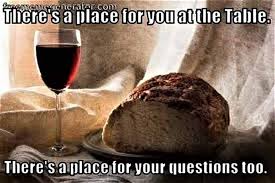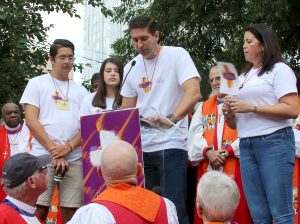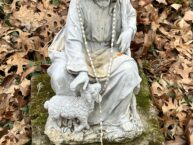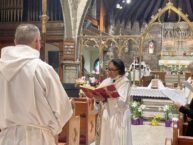 October 20, 2019: May God’s words alone be spoken, may God’s words alone be heard. Amen.
October 20, 2019: May God’s words alone be spoken, may God’s words alone be heard. Amen.
Now, I know it must be really hard to imagine something like what we heard about in the gospel today, right? I mean, come on Jesus, there’s no such thing as a justice system that turns its back on the marginalized – in this case, a poor widow – that never happens, right? And all this to tell his followers that they need to pray always and not to lose heart. While there is a lot to say about this that is important, I want to first turn our attention today to the Hebrew scripture from Genesis we heard this morning, with the story of Jacob by the Jabbok.
Jacob, his two wives… So, let’s pause here, because for all those who say that marriage should be defined as one man and one woman because that is how God intends it apparently never actually read the bible they like to thump, because biblical marriage was not always between one man and one woman. [holding aloft a rainbow sign like the TV spots] Dum-dum-de-dum! Now you know.
Anyway, he and his wives, and kids, livestock, etc. are on their way back from the land of his father-in-law and Uncle Laban, to the land Jacob fled when he really ticked of his older brother Esau. He ends up at the Jabbok river, where he sends the whole kit and kaboodle traveling with him over to the other side, while he lays down for a rest. There he ends up in a wrestling match with a mysterious being until daybreak. In a totally unfair move that would earn an ejection from even the hokey “professional” wrestling circuit, the being knocks Jacob’s hip out of joint. Jacob grabs hold of him, and won’t let go. It’s nearly daybreak and the being tells Jacob to free him, but Jacob, always big on blessings, demands one from this guy. The being says “What’s your name?” Jacob tells him, and the being says “You shall no longer be called Jacob, but Israel, for you have striven with God and with humans, and have prevailed.” And there he blessed him. So Jacob called the place Peniel, saying, “For I have seen God face to face, and yet my life is preserved.”
See, it is a good story, right? But before we go any further, we need to know more about Jacob for any of this to make sense. I mean, why on earth would God decide to wrestle this guy all night. First, we need to know that Jacob is no prince. In fact, like most of our patriarchs in the bible, he is a deeply flawed man. And today’s scripture is one of the two that most people remember about him, right? Ask most folks what they know about Jacob, and they will likely say something about a ladder and a wrestling match. So let’s learn more about him.
Jacob is a trickster. Even in his birth narrative, he clung to the heel of his older brother Esau, hoping to pull him back down that he could be the eldest. He then steals Esau’s birthright, tricks his dying father into giving him the blessing rightly owed to Esau – which made Jacob, not Esau, the heir and took off to avoid being killed by a very angry older brother.
Jacob goes off to the land of his Uncle Laban, and on the way dreams of the ladder. Then he gets there and falls in love with Rachel, one of Laban’s daughters and wants to marry her. He promises to work seven years for his uncle for the priviledge. But, the trickster is tricked by his Uncle into marrying the Rachel’s sister, so he works more years to marry the other one, and gets back at his Uncle with a neat bit of deception about farm animals (we don’t need to go there). He’s now on his way back to his homeland, sending a “Gee, I’m coming back, and I hope you have forgiven me by now” note to his brother Esau. The messengers come back to tell him that Esau is on the way to meet him…with lots and lots of people. Rut Rho! And that brings us to today’s episode in the life of this weasel, I mean, patriarch.
He is fearful, he feels isolated (despite all of the people, cattle, and possessions he has), and he is anxious. Not a great combination for a good night’s sleep, right? So he ends up in a pitched battle with God, his own conscious, or most likely both. And if we are honest with ourselves, many of us have been here too. Many of us have been at the Jabbok.
The story of Jacob wrestling by the Jabbok came to my mind in the summer of 2018 when I was attending the General Convention of the Episcopal Church in Austin, Texas. It was Sunday, July 8th and I was atthe Bishops Against Gun Violence rally to hear from the

Philip Schentrup, surrounded by family, speaking to the crowd
Photo: Melodie Woerman/Episcopal News Service
family of Carmen Schentrup, one of the Parkland High School shooting victims. Her dad, Philip, spoke about the dark days following the murder at Parkland. He said that some people told him that she was with God – it was all part of God’s plan– that he would come to understand it more in the days ahead. He said “I was filled with anger and despair. Why would God take my daughter from my family? Why would God take one of the most incredible people I’ve ever known? Why would God inflict so much pain and suffering?”
You could hear the crowd murmuring against this horrific and deeply flawed theology. I too wanted to shout out to him that this was not true, that God did not do this – a sick human with an AR-15 did this, that God was there at the High School that day, but holding Carmen in Her arms in the teen’s final moments, and with him and all of the family in their grief – grieving with them.
But I did not have to tell him this – he had come to that place on his own. He went on to say that in his despair, in his anger with God, in that long, dark night of wrestling with all that had happened to his daughter, his family, and him, he came to understand that God is love. “I searched for an answer to this senselessness and questioned everything,” he said. “The world was upside down, and my once boundless sense of hope and happiness was destroyed by a monster.” Then something changed for him.
As he put it, “I had what I believe is a moment of inspired reflection. I understood at that moment that I had it all wrong. God did not intend to inflict deep and lasting damage on my family. God is saddened by Carmen’s murder and all the violence that people are allowed to inflict on one another. God weeps for all of his children.”
He came through prayer to understand that God did indeed have a plan, but it wasn’t as some folks would imagine it. Schentrup said that “I realized that God’s plan was simple. He gave us the ability to choose to love and to care for one another, and he taught us how to do it. Evil and violence happen in this world because we allow it, not because God allows it,” he said. “We suffer violence because we collectively allow it. God is waiting for us to choose to make the world he wants.”
“I have hope.” He said. “Hope in Jesus. I have hope in the hearts and the humanity of people. I have hope that just as people of faith led the fight to overcome segregation, laws that demean people, through love we can end senseless violence. I ask everyone here to step up, to choose to make the world a better place and then to act.”[1]
His was a witness to wrestling with God and coming to that place of fuller and deeper relationship – one in which we are not powerless, but power-ful in love – God’s love. His was a Jabbok river story. Through his grief, he fought with God, and in that fight, came to be blessed by the peace which only God can give. Through his prayer he was given new hope.
This doesn’t mean his nightmarish grief is gone. It doesn’t mean his heart is healed from the sorrow. It doesn’t mean he won’t be angry about the horror of gun violence in our country. It only means that he knows that he does not stand alone. That he was not abandoned by God. That love, God’s love, will change the world – through him – and through all those who open their hearts to following where God is calling us all.
Jesus said in the gospel that we should pray always and not lose heart. What he was getting at is the need for us to enter into a dialog with God, because that is what prayer is – a dialog – though we often fail to allow it to be a two way conversation. Jesus knew we would go through these difficult times, and that if we were to come out on the other side in a better place, we had to be willing to be in relationship with God, and sometimes relationships have battles. Ask anyone who has been married for awhile. It isn’t always a trip through the tulips…sometimes you step into some deep…well, you know.
Wrestling is good, healthy, needed – God didn’t change what Jacob was going through…life happens. God just gave Jacob the opportunity to know that he was strong enough to do the right thing, and that he was not alone when he went to meet his brother. Philip Schentrup wrestled with God, and when daybreak came, his renewed faith strengthened him to meet the difficult days ahead for himself and his family, and to step boldly forward into a calling to change the world.
And in a week when yet another black person was shot by a police officer – in her own home, and an explosion kills 62 at a mosque in Afghanistan while they were worshiping, not to mention the many personal trials some of you may be experiencing in your daily life, this is important, perhaps even life giving, to us now. We have a lot to wrestle with in our lives – our righteous anger at those in power, our pain at the injustice we see before us, with our own personal dark nights. We need our Jabbok river moments, a place where we can pray and meet God face to face.
And the reality is, that if we can’t do that, if our God is too small or weak to handle our anger, our questions, our frustrations with all that is happening to us, then perhaps we need to consider just what kind of God we think we are worshipping. I remember when I was in that proverbial dark night wrestling with God. I was grieving the death of my wife, and was fighting and yelling at God quite a bit. A sister from the convent where I am an Associate said to me, “Oh, don’t worry about it. God can handle it.” And she was right too. For what kind of God couldn’t? Not one I could worship. Because if we are to be in the fullness of relationship, one rooted in a covenant of love, we have to be able to be truthful about where we are, and how we are feeling. The God of Jacob, our God, our Christ, meets us where we are, not expects us to be something we are not.
You know, I think if we were to indicate our relationship status with God on Facebook, the answer most of us would give is “It’s complicated.” That’s one of the reasons I love the Episcopal Church is that I can have a complicated relationship with God if that is where I am at the moment, I am not asked to check my brains at the door. Here you can ask questions, though I will tell you right now, we may not have an answer for you, but we will work with you to find one. Or as one meme put it, “There is a place for you at the table…there is a place for your questions too.” Or in another one “We would rather have questions that can’t be answered, than answers that can’t be questioned.” And that is why this place, and what we do here, matters so very much.
And so here you all are today, part of this parish family, where everyone is welcome, where all may share in this holy meal, and where you can wrestle with God until daybreak…or at least until coffee hour. What does that mean to you? Because in this Stewardship season, we are asked to consider what it would mean to you if this parish didn’t exist? If our invitation to all were missing in this community, our doors closed. That is how important your pledge is. Your part in this parish means something, your pledge of time and treasure is a commitment to a relationship – with this parish family, with our community, and with God.
Jacob hobbled away from this a changed man – from trickster to patriarch of the nation of Israel. Philip Schentrup was transformed through his dark night of anger and despair into a renewed relationship with God and a new prophetic purpose in life. This church is your Jabbok, your place to pray, wrestle, question, and be transformed, because that is what happens when you are honest with where you find yourself in this faith journey, when you open yourself to God. That is what happens when God meets you where you are. Those are moments of transformation. Those are the life changing turning points that often define us for the rest of our days.
And so today, as we do in Stewardship season, you will be given a gift, blessed at the altar. It is a butterfly. Butterflies emerge from a dark cocoon, and are transformed into a new life. When you look at it, remember this:
God will always meet you where you are.
God will listen to your pain, your anger, your questions.
God will allow you to wrestle and fight against Her in those dark places, and bless you at the dawn of each new day.
And God will call you to action to make this world all that God dreams for it – for us to choose to be the change the world needs.
Remember too that it is here, in this place we call Christ Church, where we can lay down our load by our proverbial Jabbok rivers, where we can wrestle with our relationship with God, where we can cry out about the injustices of the world, where we can pray and not lose heart, and where we can emerge from this place ready to be the called people of God, ready to be the body of Christ, ready to follow the Holy Spirit and join Her in the work She is already doing in the world.
Bring these things to mind when you look at this butterfly, but most of all remember this: God will seek to transform you through Her unconditional love and grace every day, every hour, every minute, every second-that you may then transform the world.
How will you respond?
Amen.
For the audio from the 10:30am service, click below, or subscribe to our iTunes Sermon Podcast by clicking here:
[1] From my own blog at GC, and from https://www.episcopalnewsservice.org/2018/07/08/schentrups-deliver-emotional-plea-to-end-gun-violence/
The Rev. Diana L. Wilcox
Christ Church in Bloomfield & Glen Ridge
October 20, 2019
Pentecost 19 – Year C – Track 2
1st Reading – Genesis 32:22-31
Psalm 121
2nd Reading –2 Timothy 3:14-4:5
Gospel – Luke 18:1-8






